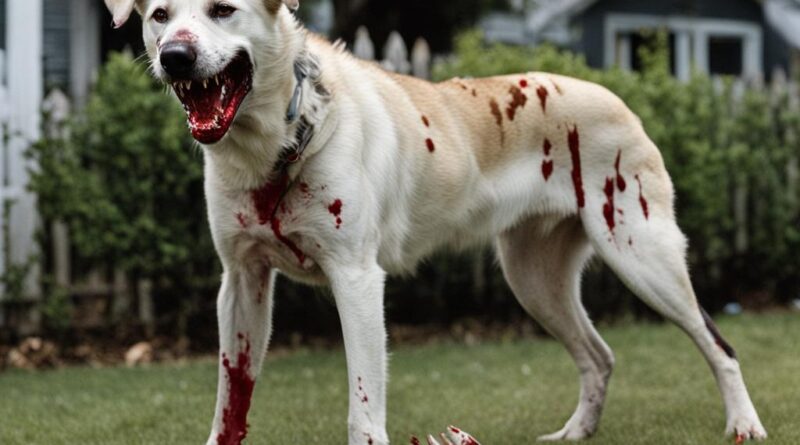What Happens If Your Dog Bites Someone on Your Property?
If your dog bites someone on your property, it’s crucial to understand the legal consequences and your responsibilities as the owner. Laws regarding dog bites vary by state, but in general, owners can be held liable for any injuries caused by their dog.
There are different standards of liability, such as strict liability and the “one bite” rule, that determine the owner’s responsibility. It’s essential to consult with a lawyer to understand the specific laws in your state and take appropriate action if your dog bites someone.
Key Takeaways:
- Owners can be held liable for dog bites on their property.
- The laws regarding dog bites vary by state.
- Consulting with a lawyer is essential to understand your legal responsibilities.
- Understanding the standards of liability, such as strict liability and the “one bite” rule, is crucial.
- Taking appropriate action is necessary if your dog bites someone.
State Dog Bite Laws
Understanding state dog bite laws is crucial for dog owners to navigate their legal responsibilities. The laws regarding dog bites vary from state to state, with some operating on a strict liability basis, while others follow the “one bite” rule. It is important to be familiar with these laws to ensure compliance and protect oneself legally.
Strict Liability
In some states, dog owners are held strictly liable for any injuries caused by their dogs, regardless of the dog’s previous behavior or the owner’s knowledge of aggression. This means that if a dog bites someone, the owner is automatically responsible for the resulting damages. Strict liability laws prioritize the safety and well-being of the public and place the burden of responsibility on the dog owner.
One Bite Rule
Other states adhere to the “one bite” rule, which means that an owner is only held liable for a dog bite if they were aware or should have been aware of the dog’s dangerous propensity. This rule assumes that if a dog has bitten someone before, the owner should have known about the dog’s aggression and taken appropriate measures to prevent future incidents.
Negligence Framework
Some states allow personal injury claims related to dog bites based on a negligence framework. Under this framework, the owner’s actions are evaluated for negligence in controlling their dog. If it is determined that the owner failed to exercise reasonable care in preventing the dog bite, they may be held liable for the resulting injuries and damages.
It is important for dog owners to be aware of the laws in their specific state regarding dog bites. Understanding whether strict liability, the “one bite” rule, or a negligence framework applies can help owners navigate their legal responsibilities and take appropriate measures to prevent dog bites. Consulting with a lawyer who specializes in dog bite cases can provide further guidance and protection.
Holding Someone Liable under the “One Bite” Rule
Under the “one bite” rule, an owner is only held liable for a dog bite if they were aware or should have been aware of the dog’s dangerous propensity. To prove liability under this rule, it must be shown that the dog had a history of aggression, the owner knew or should have known about it, and the dog’s aggressive behavior caused the injury. Owners can defend against this by demonstrating that their dog has never bitten anyone before, is not trained as an attack or guard dog, and is not of a breed considered dangerous.
In cases where a dog has a previous history of aggression, it becomes crucial to establish owner knowledge. If an owner can demonstrate that they had no prior knowledge of their dog’s dangerous propensity, it can help in defending against liability. This can be achieved by providing evidence that the dog has never been aggressive towards people before or that it is not trained or used as an attack or guard dog. It is also important to note that the breed of the dog can play a role in determining liability. Certain breeds may be considered more prone to aggression, and this can impact the owner’s responsibility.
“The owner may not be held liable if there is no evidence of any previous aggressive behavior, and the dog has never bitten anyone before. However, it is essential to gather witness testimony, such as statements from friends, family members, or neighbors, who can attest to the dog’s non-aggressive behavior to strengthen this defense.”
Proving Liability
Proving liability under the “one bite” rule can be challenging, as it requires establishing the owner’s knowledge of the dog’s dangerous propensity. Evidence such as medical records, witness testimony, and any previous reports or complaints about the dog’s behavior can be crucial in proving that the owner should have known about the dog’s aggression. It is important to consult with a lawyer experienced in dog bite cases who can guide you through the legal process and help gather the necessary evidence to prove liability.
Overall, holding someone liable under the “one bite” rule requires demonstrating that the owner was aware or should have been aware of their dog’s dangerous propensity. By providing evidence that the dog had no previous history of aggression or that the owner had no knowledge of their dog’s aggressive tendencies, the owner may be able to defend against liability. If you find yourself facing liability for a dog bite, it is crucial to consult with a knowledgeable attorney who can provide legal guidance and protect your interests.
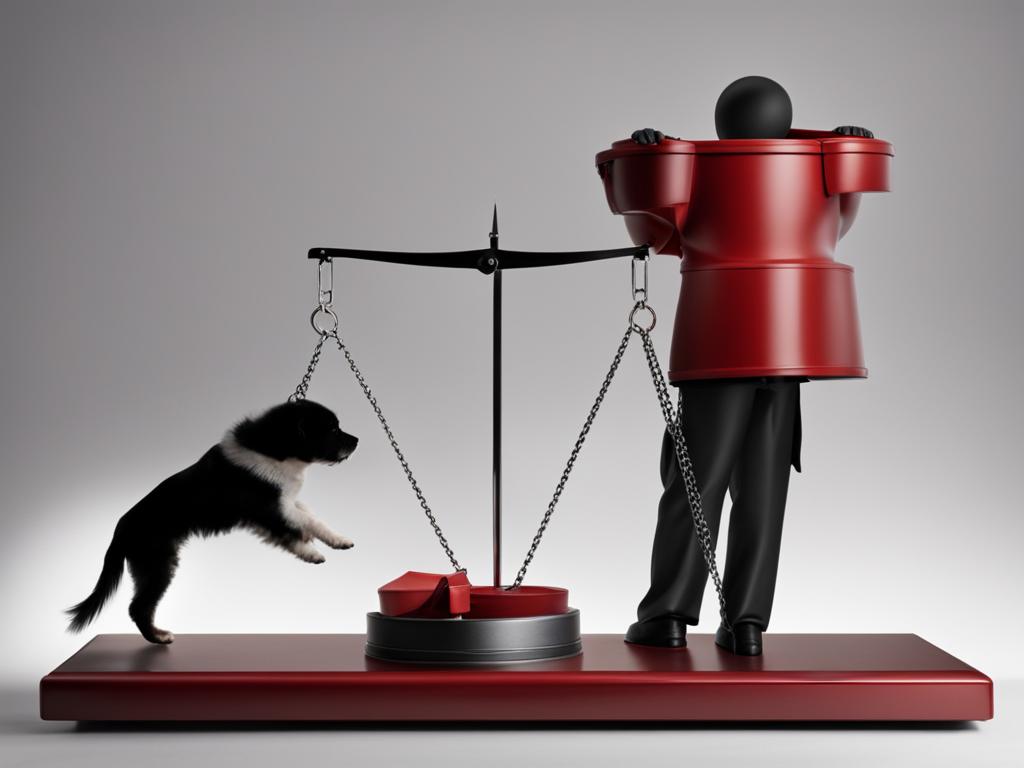
Strict Liability for Dog Bites
In some states, strict liability applies to dog bites, meaning that the owner is automatically held liable for the first bite, regardless of previous behavior or knowledge. This is important to understand as a dog owner, as it means you can be held responsible for any injuries caused by your dog, even if you were not aware of any aggressive tendencies. However, there are exceptions to strict liability that you should be aware of.
Exceptions to strict liability:
- If the person bitten was trespassing on your property without permission, you may not be held liable for the dog bite.
- If the person provoked your dog, such as by teasing or tormenting it, your liability may be reduced or eliminated.
- If your dog was performing its duties as a police or military dog at the time of the bite, you may not be held liable.
- Some states have specific laws regarding dog bites on working farms or ranches, which may affect liability.
To protect yourself financially in case of a dog bite claim, it is important to consider dog bite insurance coverage. This type of insurance can help cover medical expenses and legal fees associated with a dog bite incident. It is crucial to understand the specific laws in your state, consult with an attorney, and ensure you have adequate insurance coverage to protect yourself and your assets.
| States with strict liability | States with the “one bite” rule | States with negligence framework |
|---|---|---|
| California | Texas | Florida |
| Illinois | Ohio | Georgia |
| New York | Pennsylvania | North Carolina |
| … | … | … |
“Dog bite incidents can lead to costly legal battles and potential damage to your finances. It’s important to understand the laws in your state and take the necessary precautions to prevent dog bites. Dog bite insurance coverage can provide you with peace of mind and financial protection in case of a claim.”
Consequences of Dog Bites
Dog bites can have severe consequences for both the victim and the dog owner. The aftermath of a dog bite incident involves various legal, practical, and emotional considerations. In this section, we explore the different consequences that may arise as a result of a dog bite, including dog bite quarantine, potential relocation of the dog, and the possibility of compensation for the victim.
One of the immediate consequences of a dog bite is the potential requirement for the dog to undergo quarantine. Depending on the state, this period of quarantine can range from a few days to several weeks. The purpose of quarantine is to determine if the dog is carrying any diseases, such as rabies, which can be transmitted through a bite. During this period, the dog is isolated from other animals and its health is closely monitored.
In some cases, especially if the dog has a history of aggression or multiple incidents of biting, the owner may be faced with the difficult decision of whether to relocate the dog. This is often done to ensure the safety of others and to prevent further incidents. Relocation can involve finding a new home for the dog with experienced handlers or even surrendering the dog to a shelter or rescue organization.
Additionally, victims of dog bites may seek compensation for their injuries. This can include reimbursement for medical expenses, such as hospital bills and ongoing treatment costs. Compensation may also cover other damages, such as pain and suffering, psychological trauma, and lost wages due to time off work. The amount of compensation awarded depends on various factors, including the severity of the injuries and the long-term impact on the victim’s life.
| Consequences | Description |
|---|---|
| Dog Bite Quarantine | A period of isolation for the dog after a bite to monitor for any disease transmission, such as rabies. |
| Dog Relocation | The potential need to rehome the dog to prevent further incidents and ensure the safety of others. |
| Dog Bite Compensation | Potential financial compensation sought by the victim to cover medical expenses, pain and suffering, and other damages resulting from the bite. |
It is important to note that the specific consequences of a dog bite can vary depending on the state laws and the circumstances of the incident. Consulting with a legal professional experienced in dog bite cases is crucial to understanding the rights and responsibilities of both the victim and the dog owner.
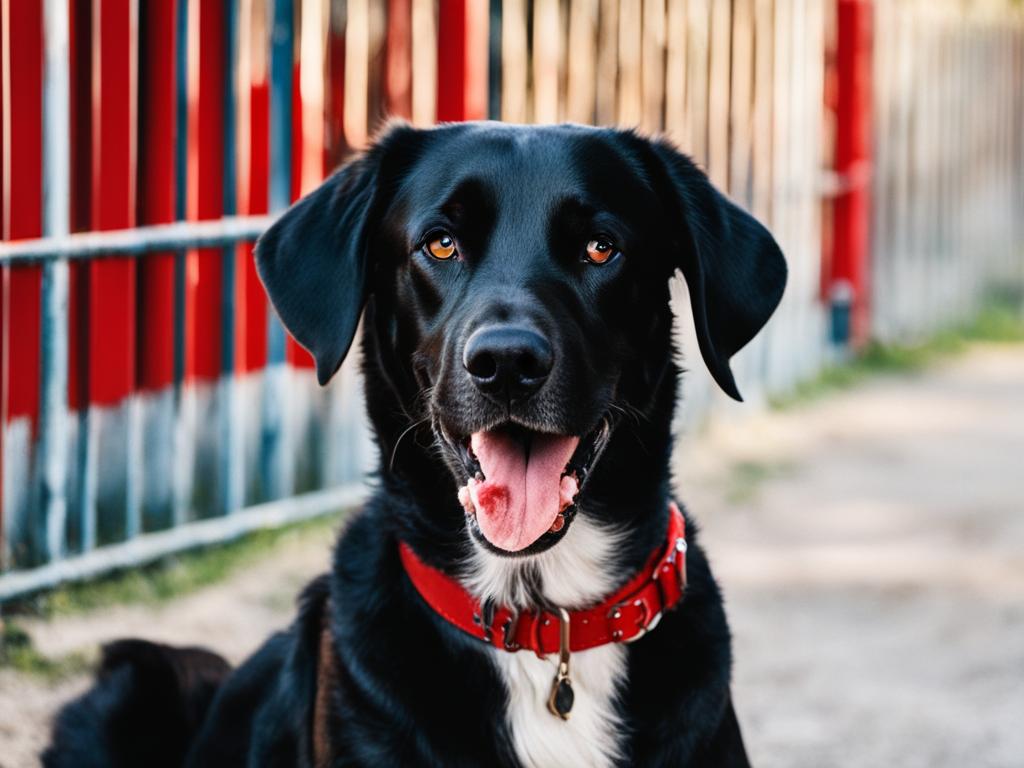
Defending Against Knowledge of Dangerous Propensity
When facing liability for a dog bite, it is essential to mount a strong defense against the claim that you knew or should have known about your dog’s dangerous propensity. There are several key arguments that can be used to establish your lack of knowledge and mitigate your liability.
1. Lack of Previous Incidents
If your dog has never bitten anyone before, it can be argued that you had no reason to believe that your dog posed a danger to others. This defense emphasizes the absence of any history of aggression or aggressive behavior, highlighting your dog’s overall non-aggressive nature.
2. Non-Aggressive Training
Another defense is to demonstrate that your dog is not trained or used as an attack or guard dog. This emphasizes that your dog’s purpose and training do not involve aggression towards others, further supporting the argument that you had no reason to suspect any dangerous propensity.
“My dog has always been gentle and friendly towards both people and other animals. He has never shown any signs of aggression, and his training focuses on obedience and socialization.”
3. Non-Dangerous Breed
It can also be advantageous to establish that your dog does not belong to a breed considered dangerous. By highlighting that your dog’s breed is not typically associated with aggressive behavior, you can further bolster your argument that you had no reason to suspect any dangerous tendencies.
When defending against liability, it is crucial to gather witness testimony from friends, family members, and neighbors who can vouch for your dog’s non-aggressive behavior. Their accounts can play a significant role in supporting your defense and establishing your lack of knowledge about any dangerous propensity.
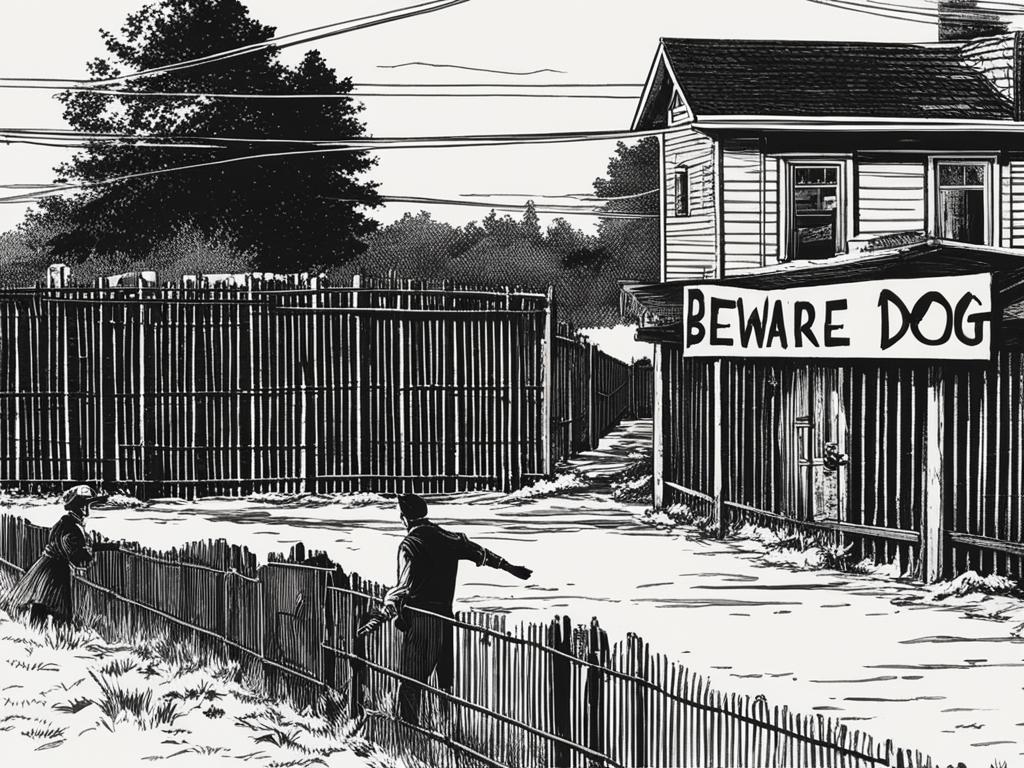
| Defense Strategy | Description |
|---|---|
| Lack of Previous Incidents | Emphasizes the absence of any history of aggression or aggressive behavior in your dog. |
| Non-Aggressive Training | Highlights that your dog’s purpose and training do not involve aggression towards others. |
| Non-Dangerous Breed | Establishes that your dog does not belong to a breed typically associated with aggressive behavior. |
Liability for Dog Bites on Private Property
When a dog bites someone on private property, the liability for the incident extends beyond just the dog owner. Property owners can also be held responsible for dog bites under premises liability laws. The extent of their liability, however, depends on various factors, such as whether the person bitten was invited or a trespasser.
Under premises liability laws, property owners have a duty to maintain safe premises and warn guests about potential dangers, which includes the presence of a dog that may pose a risk. If a guest or visitor is bitten by a dog on the property, the property owner may be held liable for the injuries.
It’s important to note that liability for trespassers is generally limited. However, there can be exceptions, particularly in cases involving children. Property owners should take reasonable measures to prevent dog bites, even for trespassers, especially if there is a possibility of children gaining access to the property.
“Under premises liability laws, property owners have a duty to maintain safe premises and warn guests about potential dangers…”
| Type of Visitor | Liability |
|---|---|
| Invited Guest | Property owner can be held liable |
| Trespasser | Liability is generally limited, but there can be exceptions, particularly if the trespasser is a child |
If you are a property owner and have a dog on your premises, it’s crucial to take precautions to prevent dog bites and ensure the safety of both your guests and trespassers. This includes properly restraining and supervising your dog, as well as providing warning signs or verbal warnings about the presence of the dog on your property.
Consulting with a lawyer who specializes in dog bite cases can provide you with guidance on your responsibilities as a property owner and help protect you from potential liability in dog bite incidents.
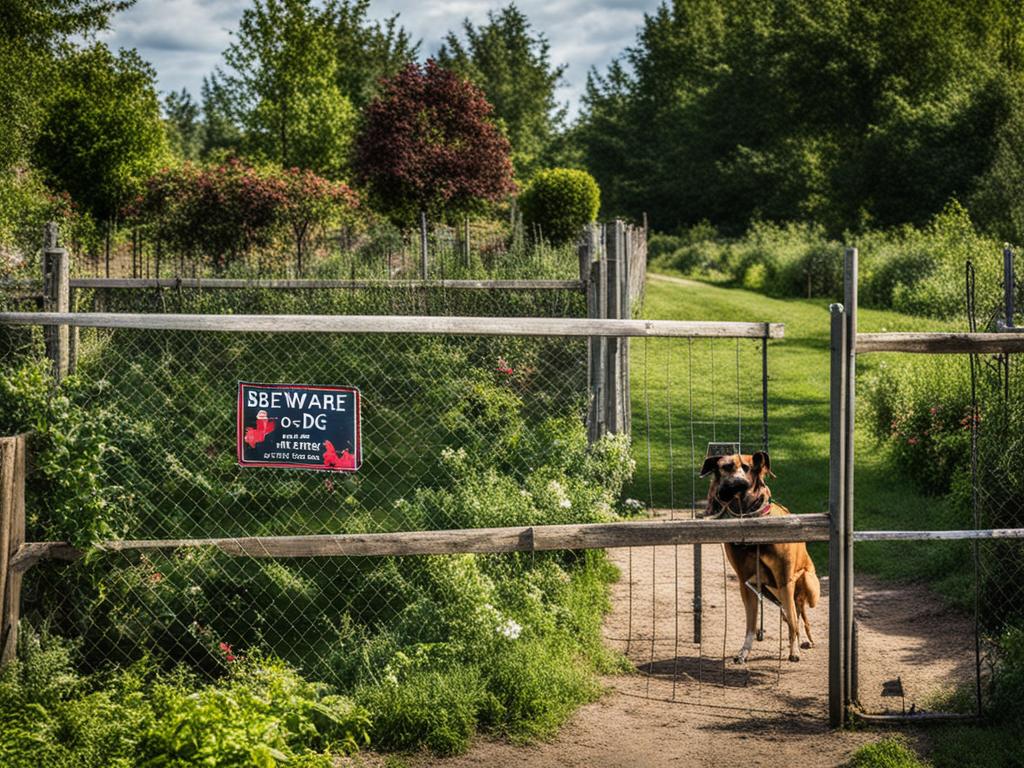
Damages in Dog Bite Cases
In cases of dog bites, the injured party may seek compensation for various damages. These damages can include medical expenses, plastic surgery, physical pain and suffering, emotional distress, lost wages, future lost earning capacity, and scarring. The value of a dog bite claim depends on factors such as the severity of the injuries and the long-term impact on the victim’s life. It is important to note that contributory fault laws may reduce the amount of compensation if the victim contributed to the cause of the dog attack.
Medical expenses are a significant component of dog bite damages. This includes the cost of emergency medical treatment, hospital stays, surgeries, medication, and rehabilitation. The injured party may also seek compensation for any ongoing medical care or therapy related to their injuries.
In addition to physical injuries, dog bites can also result in scarring, which can have a lasting impact on the victim’s appearance and self-esteem. Compensation for scarring may cover the cost of cosmetic procedures or treatments to minimize the appearance of scars.
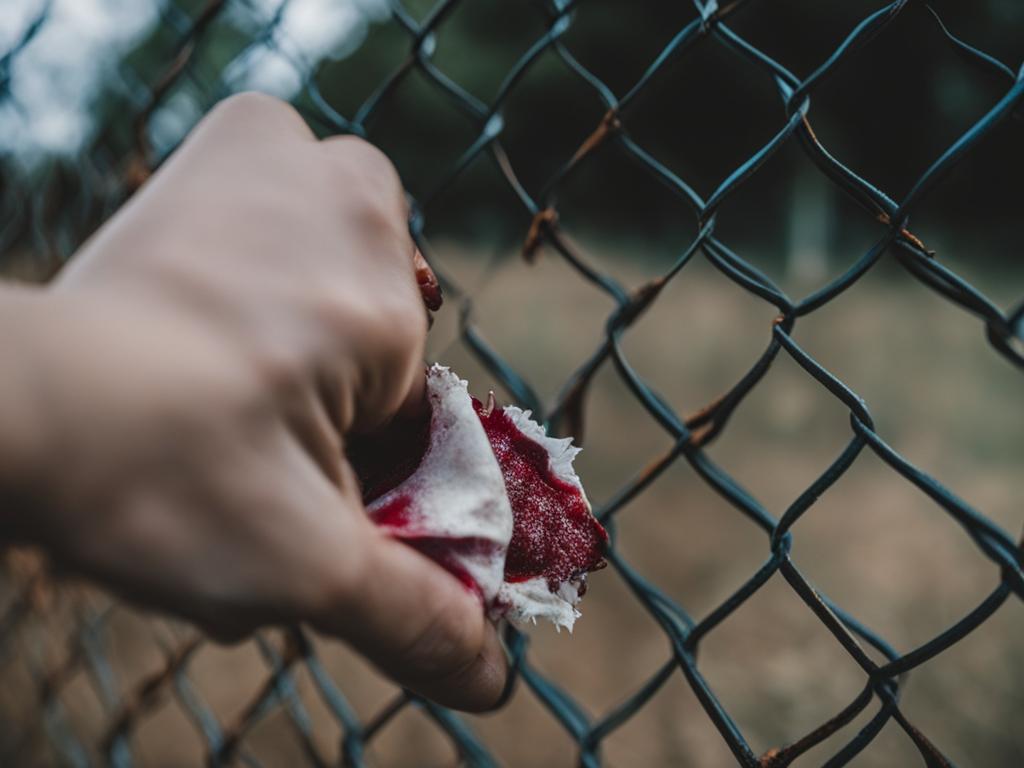
| Damage Type | Description |
|---|---|
| Medical Expenses | Cost of medical treatment, surgeries, medication, and ongoing care |
| Pain and Suffering | Physical and emotional distress experienced as a result of the dog bite |
| Emotional Distress | Mental anguish, anxiety, and trauma caused by the dog bite |
| Lost Wages | Compensation for time off work due to the injuries sustained |
| Future Lost Earning Capacity | Compensation for the loss of ability to earn income in the future |
| Scarring | Compensation for physical scars resulting from the dog bite |
Conclusion
In conclusion, being aware of the legal consequences and your responsibilities as a dog owner is crucial if your dog bites someone on your property. Understanding the specific laws in your state, such as strict liability or the “one bite” rule, can help determine your liability. Consulting with a lawyer who specializes in dog bite cases is important to ensure you take appropriate action.
Preventing dog bites on your property is key to avoiding accidents and injuries. Training your dog, socializing them with other people and animals, and providing proper supervision can help reduce the risk of bites. Additionally, considering dog bite insurance coverage can provide financial protection in case of a claim.
Remember, every case may vary based on state laws and specific circumstances, so seeking professional advice in your particular situation is essential. By taking precautions and staying informed, you can help create a safe environment for both your dog and others.
FAQ
What should I do if my dog bites someone on my property?
If your dog bites someone on your property, it is important to understand the legal ramifications and your responsibilities as the owner. Consult with a lawyer to understand the specific laws in your state and take appropriate action.
What are the different standards of liability for dog bites?
The standards of liability for dog bites vary by state. Some states operate on a strict liability basis, while others follow the “one bite” rule or negligence framework. Consult with a lawyer to understand the laws in your state.
What is the “one bite” rule?
The “one bite” rule states that an owner is only held liable for a dog bite if they were aware or should have been aware of the dog’s dangerous propensity. Consult with a lawyer to understand how this rule applies in your state.
When does strict liability apply for dog bites?
Strict liability applies in some states, meaning that the owner is automatically held liable for the first bite. However, there can be exceptions to strict liability. Consult with a lawyer to understand the laws in your state and consider dog bite insurance coverage.
What are the consequences of a dog bite?
Consequences of a dog bite can vary by state but may include quarantine for the dog, removal of the dog from the owner, and potential legal action by the victim seeking compensation. Consult with a lawyer to understand the consequences in your state.
How can I defend against liability for a dog bite?
Possible defenses include demonstrating that your dog has never bitten anyone before, is not trained or used as an attack or guard dog, and does not belong to a breed considered dangerous. Gathering witness testimony can also help in defending your lack of knowledge about any dangerous tendencies. Consult with a lawyer for guidance.
Can a property owner be held liable if a dog bites someone on their premises?
Yes, under premises liability laws, a property owner can be held liable if a dog bites someone on their premises. The extent of liability depends on various factors, such as whether the person bitten was invited or a trespasser. Consult with a lawyer to understand the laws in your state.
What damages can be sought in a dog bite case?
Damages in a dog bite case can include medical expenses, plastic surgery, physical pain and suffering, emotional distress, lost wages, future lost earning capacity, and scarring. Consult with a lawyer to understand the potential damages in your case.
How can I prevent dog bites on my property?
Taking precautions such as proper training, socialization, and supervision can help prevent dog bites. Consult with a professional dog trainer or behaviorist for guidance on managing your dog’s behavior.

